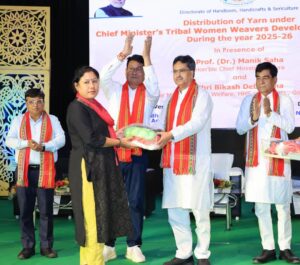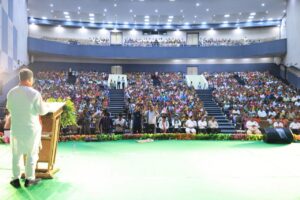Tripura CM Dr. Manik Saha announces recruitment of 170 wardens for tribal hostels and free yarn for 20,000 women weavers, reaffirming the government’s commitment to the socio-economic empowerment of Janajati communities and preservation of traditional crafts.
Reaffirming his government’s unwavering commitment to the welfare of tribal communities, Tripura Chief Minister Dr. Manik Saha on Tuesday said that the state is steadily advancing toward inclusive growth and socio-economic empowerment of the Janajati population.
Speaking at a free yarn distribution programme under the Chief Minister’s Tribal Women Weavers Development Programme at Rabindra Shatabarshiki Bhavan, Dr. Saha announced that the state cabinet has approved the recruitment of around 170 wardens for tribal hostels across the state — a move aimed at strengthening the educational and welfare infrastructure in tribal-dominated areas.

“The present government is fully committed to improving the socio-economic conditions of our Janajati people. Earlier, many political parties used tribal communities merely as vote banks, shedding crocodile tears for them. But since 2014, under the visionary leadership of Prime Minister Narendra Modi, there has been a real transformation in tribal welfare,” Dr. Saha said.
The Chief Minister recalled that even former Prime Minister Atal Bihari Vajpayee had initiated numerous welfare programmes for the upliftment of tribal people. “Following their footsteps, our government and the Tribal Welfare Department are working with utmost sincerity for their all-round development,” he added.
Focus on Unity and Development
Dr. Saha cautioned against divisive politics, emphasizing that unity and collective progress are the pillars of lasting development.
“Those who still indulge in the politics of division are obstacles to progress. Development can only happen when we move forward together,” he remarked, calling upon all communities to uphold Tripura’s spirit of harmony.
The Chief Minister highlighted that Tripura is a land of mixed cultures, home to 19 tribal communities and over 40 sub-groups, and that preserving their distinct identities is a key part of the government’s vision.
“Our aim is to make Tripura a model of harmony and inclusive growth,” he said, reiterating the government’s focus on improving infrastructure and the quality of life in tribal-dominated regions.
Empowering Tribal Women Weavers
Referring to the importance of the weaving tradition in tribal life, Dr. Saha said the government is determined to preserve and promote the creative legacy of traditional weavers.

“Thread holds special significance for our Janajati mothers and sisters. Under this programme, about 20,000 tribal women weavers have been selected at the district level to receive free yarn. Each weaver will get 1.25 kilograms of yarn, worth ₹887 per kilogram,” he said.
He further added that Tripura’s traditional handwoven “Risa” and “Pachra” have recently received the Geographical Indication (GI) tag, bringing national recognition to the state’s indigenous art.
The Chief Minister also noted that over 4.8 lakh women in rural Tripura are now part of Self-Help Groups (SHGs), gaining financial independence through access to bank loans and livelihood activities in agriculture, animal husbandry, and handicrafts.
Massive Investment in Tribal Areas
Highlighting the government’s fiscal commitment, Dr. Saha said that around 40 percent of the state budget is dedicated exclusively to development in tribal areas.
“From roads to electricity and drinking water, our focus is on strengthening the foundation of rural infrastructure,” he emphasized.
To ensure efficient implementation of welfare schemes, officers equivalent to Tripura Civil Service (TCS) rank have been appointed at district and sub-divisional levels, he added.
Leaders Applaud the Initiative
The event was also attended by Tribal Welfare Minister Bikash Debbarma, Agartala Municipal Corporation Mayor and MLA Dipak Majumder, Handloom and Handicrafts Director Ajit Shukladas, and social worker Bipin Debbarma, among other dignitaries.
Minister Bikash Debbarma praised the initiative, stating that the government has taken a crucial step toward ensuring the economic self-reliance and social empowerment of tribal women.
“Through the Chief Minister’s Tribal Women Weavers Development Programme, the state is not only empowering women but also giving a new direction to Tripura’s handloom industry. This initiative will enhance their skills, training, and marketing linkages, making them financially stronger,” he said.
| Also Read: Governor Reddy reviews India-Bangladesh Border Progress |
| Also Read: Dr. Saha calls Press the Pulse of Vibrant Democracy |
Both leaders concluded that self-reliant tribal women symbolize a self-reliant Tripura, echoing the state’s commitment to holistic and inclusive growth.













